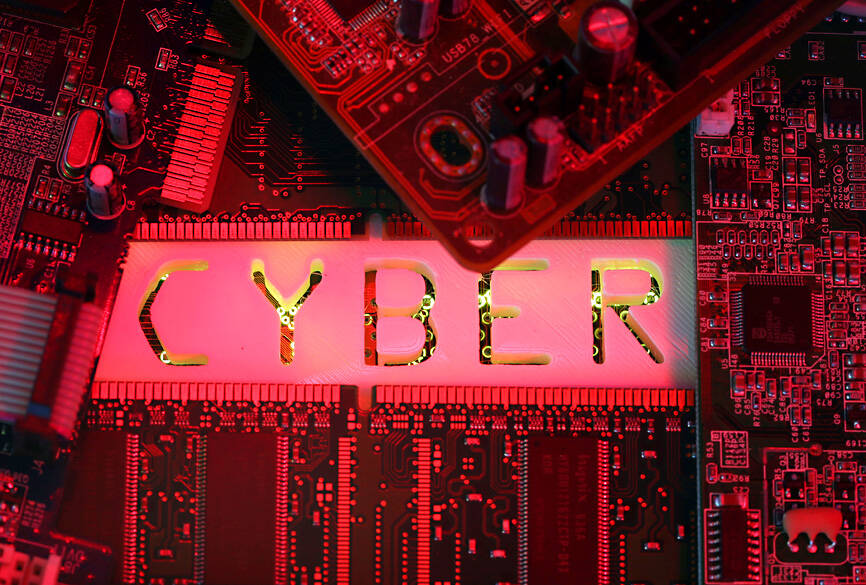Taiwan showcased its valuable insights into countering Chinese cyberattacks in a workshop with the US and India, an Indian researcher said in an article published yesterday.
The Taipei Economic and Cultural Center in India, the US embassy in New Delhi and the New Delhi-based think tank United Service Institution of India on Dec. 11 held a workshop under the Global Cooperation and Training Framework on cybersecurity in the Indian capital to discuss cybersecurity challenges and opportunities, the Ministry of Foreign Affairs said.
The workshop aimed to improve coordination among like-minded partners and enhance crisis response capabilities, it said.

Photo: Reuters
Taiwan’s advanced cybersecurity measures have become crucial amid heightened tensions with China, Krutika Patil, a former cybersecurity research analyst at the Manohar Parrikar Institute for Defence Studies and Analyses, told Voice of America (VOA).
Joining forces with the US and Taiwan to counter Chinese cyberattacks was “a rare move” for India, VOA said, calling the workshop “an important response to China’s escalating cybersecurity threats.”
Representatives from the three countries discussed in detail how to counter cyberattacks launched by organizations being developed and trained by the Chinese People’s Liberation Army, it said.
The workshop was “an important response to China’s escalating cybersecurity threats,” Patil said.
Due to their scale, complexity and diverse targets, which range from government agencies to critical infrastructure, Chinese cyberbehavior is concerning, she said.
However, Taiwan could provide valuable experience on that front, as it has been facing sophisticated Chinese cyberespionage campaigns and aggressive attacks on its critical infrastructure, she said.
The nation’s cutting-edge technological defenses and strong public and private cybersecurity networks provide “a model for global cyberdefense strategies,” Patil said.
The comprehensive legal and policy framework for dealing with cyberthreats also provides “a benchmark” for creating cybersecurity regulations, she added.
The framework can pool resources to tackle cyberthreats, allow information-sharing, establish consistent cybersecurity standards and serve as a strategic deterrent to invasive cyberactivities, Patil said.
Representative to India Baushuan Ger (葛葆萱) and US Ambassador to India Eric Garcetti said in their opening remarks at the workshop that they hoped to enhance the resilience of digital democracy through in-depth discussions on the digital economy, artificial intelligence, cybercrime and ways to defend critical information infrastructure, the Ministry of Foreign Affairs said.
Former Indian national cybersecurity coordinator Rajesh Pant and Indian National Security Advisory Board member Anshuman Tripathi hope to cooperate with Taiwan and the US to improve cybersecurity, it added.

MAKING WAVES: China’s maritime militia could become a nontraditional threat in war, clogging up shipping lanes to prevent US or Japanese intervention, a report said About 1,900 Chinese ships flying flags of convenience and fishing vessels that participated in China’s military exercises around Taiwan last month and in January have been listed for monitoring, Coast Guard Administration (CGA) Deputy Director-General Hsieh Ching-chin (謝慶欽) said yesterday. Following amendments to the Commercial Port Act (商港法) and the Law of Ships (船舶法) last month, the CGA can designate possible berthing areas or deny ports of call for vessels suspected of loitering around areas where undersea cables can be accessed, Oceans Affairs Council Minister Kuan Bi-ling (管碧玲) said. The list of suspected ships, originally 300, had risen to about 1,900 as

Japan’s strategic alliance with the US would collapse if Tokyo were to turn away from a conflict in Taiwan, Japanese Prime Minister Sanae Takaichi said yesterday, but distanced herself from previous comments that suggested a possible military response in such an event. Takaichi expressed her latest views on a nationally broadcast TV program late on Monday, where an opposition party leader criticized her for igniting tensions with China with the earlier remarks. Ties between Japan and China have sunk to the worst level in years after Takaichi said in November that a hypothetical Chinese attack on Taiwan could bring about a Japanese

MORE RESPONSIBILITY: Draftees would be expected to fight alongside professional soldiers, likely requiring the transformation of some training brigades into combat units The armed forces are to start incorporating new conscripts into combined arms brigades this year to enhance combat readiness, the Executive Yuan’s latest policy report said. The new policy would affect Taiwanese men entering the military for their compulsory service, which was extended to one year under reforms by then-president Tsai Ing-wen (蔡英文) in 2022. The conscripts would be trained to operate machine guns, uncrewed aerial vehicles, anti-tank guided missile launchers and Stinger air defense systems, the report said, adding that the basic training would be lengthened to eight weeks. After basic training, conscripts would be sorted into infantry battalions that would take

DEEP-STRIKE CAPABILITY: The scenario simulated a PLA drill that turned into an assault on Taiwan’s critical infrastructure, with the launchers providing fire support Taiwan yesterday conducted this year’s first military exercises at Longsiang Base in Taichung, demonstrating the newly acquired High Mobility Artillery Rocket System’s (HIMARS) ability to provide fire support and deep-strike capabilities. The scenario simulated an attack on Penghu County, with HIMARS trucks immediately rolling into designated launch areas and firing barrages at the Wangan (望安) and Cimei (七美) islands, simulating the provision of fire support against invading forces. The HIMARS are supposed to “fire and leave,” which would significantly increase personnel and equipment survivability, a military official said. The drill simulated an exercise launched by the Chinese People’s Liberation Army (PLA) Eastern